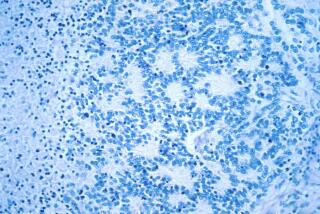Study: Cells May Slow Alzheimer’s
- Share via
Injections of genetically altered cells into the brain appear to nourish ailing neurons and may slow the cognitive decline in patients with Alzheimer’s disease, scientists reported Sunday in the online journal Nature Medicine.
The experimental approach, pursued by researchers in a preliminary study at UC San Diego, aims to rejuvenate brain cells by providing a steady supply of a nerve-nurturing hormone secreted by the injected cells.
In studies involving eight Alzheimer’s patients, most showed evidence of increased nerve growth and activity in the region of the brain most affected by the degenerative disease. Psychological test scores suggested the treatment also tempered the slow slide into dementia.
“If these effects are borne out in larger, controlled trials, this could be a significant advance over existing therapies for Alzheimer’s disease,” said study leader Mark H. Tuszynski, director of UCSD’s Center for Neural Repair.
But Tuszynski and other experts cautioned that the study was designed to test the technique’s safety, not its efficacy, so the hints of improvement -- while tantalizing -- are unreliable. And although the results do offer new evidence that nerve growth hormones may prove useful, the surgical implantation of gene-altered cells is widely considered to be too complicated a technique for the routine delivery of those hormones.
“This would not be a practical way of going around treating 4 1/2 [million] or 5 million Alzheimer’s patients, although it would be a boon for neurosurgeons,” said Zaven Khachaturian, a science advisor to the Alzheimer’s Assn. in Chicago and former director of the office of Alzheimer’s research at the National Institutes of Health.
For that reason, a simpler system of getting the hormones into the brain is being tested.






